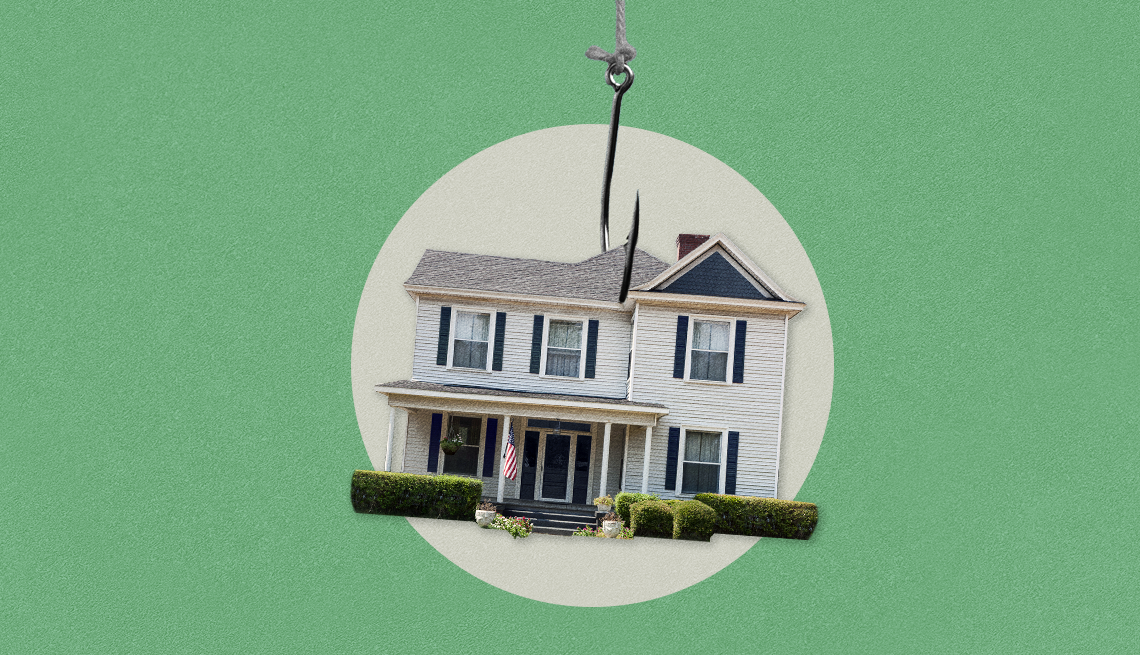AARP Hearing Center


When you own a house, you think it’s yours. Full stop. That’s why it was so shocking when a couple in Tampa, Florida, Dreama and Larry Bilby, discovered that a pair of scammers had filed a deed that transferred ownership of their home. It was a quitclaim deed, which is typically used for transferring properties without a sale, such as from a parent to a child. But in this case, criminals exploited it to steal from the unsuspecting couple. It was made easier because the Bilbys lived elsewhere while their house was being renovated.
The good news: the Bilbys had a camera on the property and saw the scammers, which helped with their eventual arrest and 15-year prison sentence.
(Listen to this episode of AARP’s The Perfect Scam℠ podcast to hear more on their story.)
Real estate fraud expert Tom Cronkright says scams like this one — which take the form of home title theft, title fraud and seller impersonation — are increasingly common and often successful. It’s not always through a quickclaim deed, however: Sometimes a scammer will impersonate the owner, hire a real estate agent to list and sell the property, and then the scammer walks away with the sale proceeds after the closing.
“Title theft is … the perfect real estate crime,” says Cronkright, cofounder and executive chair of CertifID, a wire fraud prevention firm, and Sun Title, a residential and commercial title company in Grand Rapids, Michigan. Unlike other forms of identity theft that require access to victims’ online accounts, Cronkright notes, “everything that the [criminal] would need to [perpetrate title theft] is publicly available.”
The crime, which is not commonly reported (scams are notoriously underreported), can be a mess to untangle if you are targeted. You’re particularly at risk if you own an unoccupied property, including undeveloped land or a vacation home.
How seller impersonation fraud works
“Fraud and theft are, unfortunately, pretty common crimes. And what we’ve been seeing over the last couple of years is an uptick in seller impersonation fraud where an individual will … essentially create a persona that they are the owner of a property,” says Deanne Rymarowicz, senior counsel at the National Association of Realtors. “They will dupe a real estate professional into listing the property and, in some instances, successfully sell the property to an unsuspecting buyer even though they’re not the actual, legitimate owner of the property.”
Impersonating property owners is easy with public records and personally identifiable information acquired from hackers. “All the scammer has to do is look up who the owner is,” Cronkright says. “They run a simple search of the property tax records to identify the owner and see where the tax bill is being sent, and then they can create identity documents to impersonate the real owner with information purchased from paid sources or through the dark web. Those documents — a passport or some sort of state-issued ID — typically have a money mule’s picture on them, but with information about the real property owner.”
Cronkright adds that “over the past year, the quality of these documents has increased, making it harder to identify a fake ID from a legitimate one.”






































































More From AARP
Why You Shouldn’t Answer Calls From Unknown Numbers
PromotAvoid scams — including the ‘say yes’ or ‘can you hear me’ scam – by ignoring unsolicited callersional DescriptionDrivers: Keep an Eye Out for New Toll Road Scams
Criminals pretend to be highway officials requesting payment after your tripHow to Keep a Loved One With Cognitive Decline Safe From Scams
Key steps to protect vulnerable family members’ finances in an age of rampant fraudRecommended for You